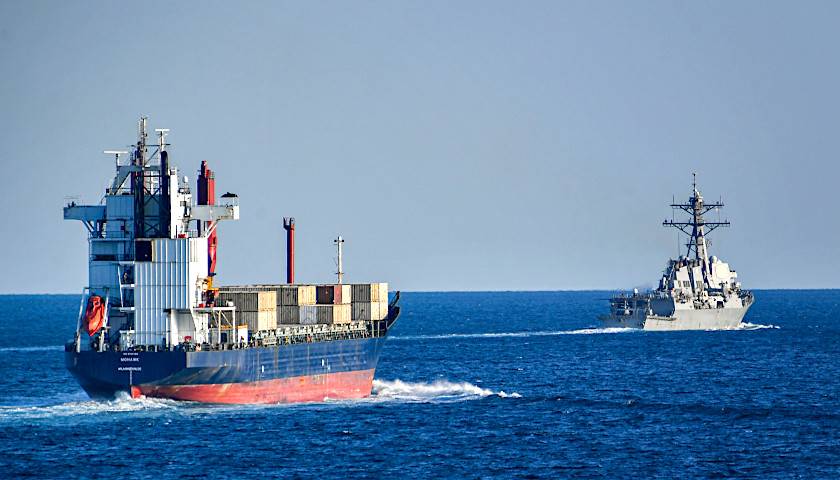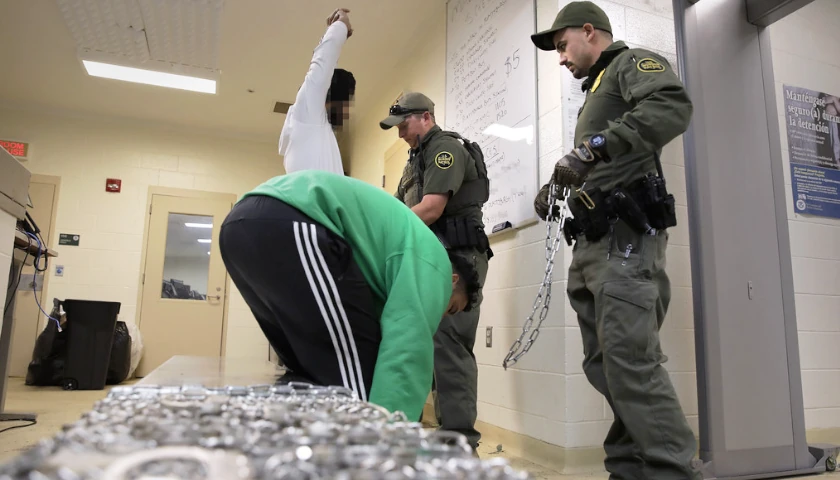by Madeleine Hubbard
The Biden administration’s security policies are raising the risk of a global economic crisis as Iran’s backing of the Houthi rebels threatens to shut down international shipping while closures at the U.S.-Mexico border prompted by illegal immigration are costing billions of dollars in trade.
The Biden administration “continues to try to make nice with this regime that has been chanting ‘Death to America’ and ‘Death to Israel’ for more than 40 years,” former Deputy National Security Adviser Victoria Coates, currently a Heritage Foundation national security expert, told the Just the News, No Noise television show last week about the White House’s relationship with Iran.
Both of the anti-U.S. and anti-Israel phrases are commonly chanted in Iran. “God is great, death to the U.S., death to Israel, curse the Jews, and victory for Islam,” is even the slogan of the Yemen-based Houthis, who call themselves Ansar Allah, the Arabic for supporters of God.
One of former President Donald Trump’s last acts before leaving office in January 2021 was designating the Houthis as a Foreign Terrorist Organization. Less than a month later, the Biden administration delisted the group, with Secretary of State Antony Blinken at the time citing how such a designation “could have a devastating impact on Yemenis’ access to basic commodities like food and fuel.”
Ever since being delisted, the Houthis have been launching attacks in the region, with a particular increase since Oct. 7, when Hamas invaded Israel and killed about 1,200 people and kidnapped approximately 240 others. The Houthis pledged to support Hamas and began targeting ships in the Red Sea. The group said it is targeting ships belonging to Israel and its allies, but it is also attacking Norwegian and Liberian vessels, according to Coates.
About 12% of global trade passes through the Red Sea and Egypt’s Suez Canal, according to the New Zealand Foreign Affairs Ministry. The only other alternative to this passageway is going around the southern tip of Africa through the Cape of Good Hope, which takes significantly more time.
The attacks from the Houthis have forced major companies such as oil giant BP to stop using the passageway.
Following weeks of Houthi attacks, the U.S. said last week that it would lead a force to patrol the region to protect against the Houthis.
Coates said the problem lies with the Biden administration’s desire to revive the Obama-era Joint Comprehensive Plan of Action, or JCPOA, with Iran, and the White House planned on using its response to the Houthis, among other things, as bargaining chips to achieve the deal.
“They were going to send a message to Iran that they were much more reasonable than their predecessors, and that they felt the Houthis were not actually terrorists and the Houthis have been acting up ever since. And most recently, with this escalated attacks on shipping,” Coates said about the Biden administration’s approach.
Even after Iran escalated plots against the United States, sanctioned U.S. citizens and cracked down on internal protests, the Biden administration still reached a controversial hostage exchange deal with Tehran, releasing five Americans for five Iranians and unfreezing $6 billion in Iranian assets.
Meanwhile, despite years of effort to revive the JCPOA, United Nations Political Affairs chief Rosemary DiCarlo said last week that “diplomatic efforts remain at a standstill.”
Beyond arming the Houthis to the point where the group is “now threatening to grind global commerce to a halt,” per Coates, Iran is also arming Hamas, Hezbollah and other terror groups and is expanding disruption efforts beyond the Middle East with an Iranian drone targeting shipping in the Indian Ocean over the weekend.
Meanwhile, a massive influx of illegal immigrants at the southern border forced U.S. Customs and Border Protection to temporarily close several crossings to reassign agents to respond to new arrivals.
Two of the suspended railroad crossings – El Paso and Eagle Pass, Texas – account for nearly $34 billion in annual trade, or just below 36% of all cross-border rail traffic entering and leaving Mexico, Axios reported Friday, citing the Texas Association of Business.
Operations resumed at the border crossings on Friday, per CBP, but Arizona’s Lukeville Port of Entry is still closed. Lukeville is the main crossing point for people traveling to Puerto Peñasco, Sonora, a popular tourism destination, and Arizona Democratic Gov. Katie Hobbs and others have heavily criticized the Biden administration over the closure.
“When you look across the board at the damage that this man and his administration are doing to this country, you have to start asking serious questions,” Rep. Eli Crane, R-Ariz., told the John Solomon Reports podcast last week.
– – –
Madeleine Hubbard is a reporter at Just the News. Follow Hubbard on X or Instagram.
Photo “Escort Through the Strait of Hormuz” by US Navy.





